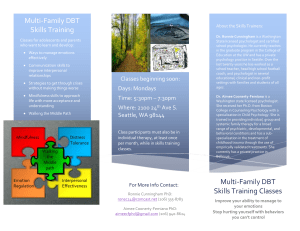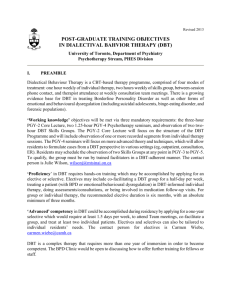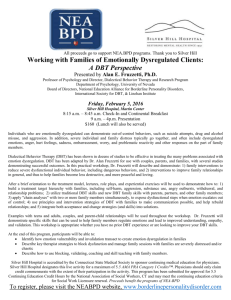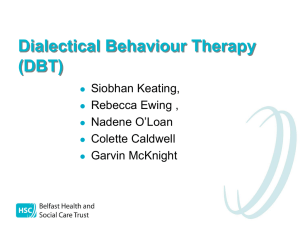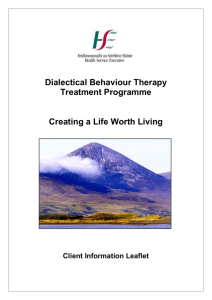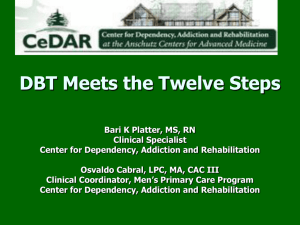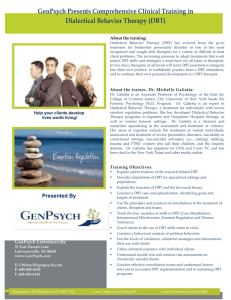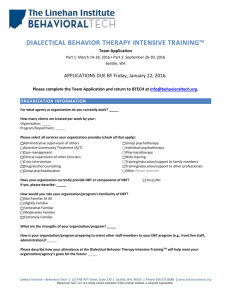What is DBT
advertisement
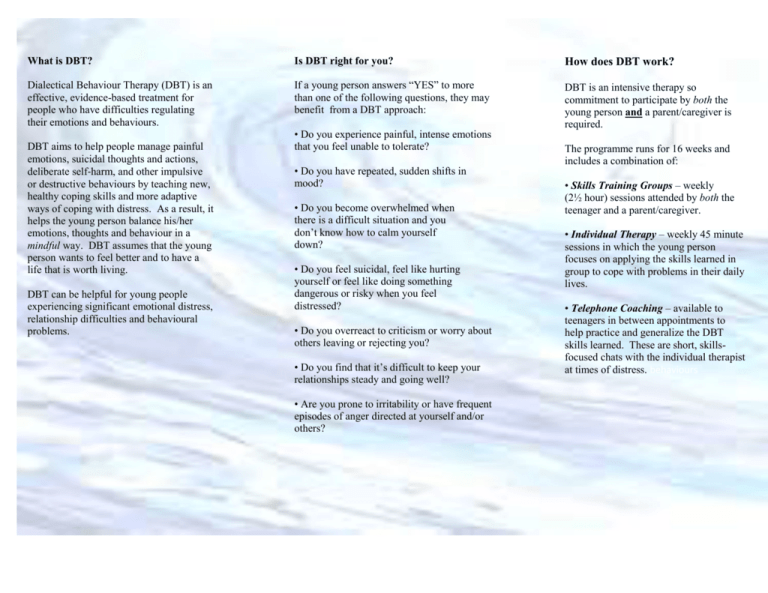
What is DBT? Is DBT right for you? How does DBT work? Dialectical Behaviour Therapy (DBT) is an effective, evidence-based treatment for people who have difficulties regulating their emotions and behaviours. If a young person answers “YES” to more than one of the following questions, they may benefit from a DBT approach: DBT is an intensive therapy so commitment to participate by both the young person and a parent/caregiver is required. DBT aims to help people manage painful emotions, suicidal thoughts and actions, deliberate self‐harm, and other impulsive or destructive behaviours by teaching new, healthy coping skills and more adaptive ways of coping with distress. As a result, it helps the young person balance his/her emotions, thoughts and behaviour in a mindful way. DBT assumes that the young person wants to feel better and to have a life that is worth living. DBT can be helpful for young people experiencing significant emotional distress, relationship difficulties and behavioural problems. • Do you experience painful, intense emotions that you feel unable to tolerate? • Do you have repeated, sudden shifts in mood? • Do you become overwhelmed when there is a difficult situation and you don’t know how to calm yourself down? • Do you feel suicidal, feel like hurting yourself or feel like doing something dangerous or risky when you feel distressed? • Do you overreact to criticism or worry about others leaving or rejecting you? • Do you find that it’s difficult to keep your relationships steady and going well? • Are you prone to irritability or have frequent episodes of anger directed at yourself and/or others? The programme runs for 16 weeks and includes a combination of: • Skills Training Groups – weekly (2½ hour) sessions attended by both the teenager and a parent/caregiver. • Individual Therapy – weekly 45 minute sessions in which the young person focuses on applying the skills learned in group to cope with problems in their daily lives. • Telephone Coaching – available to teenagers in between appointments to help practice and generalize the DBT skills learned. These are short, skillsfocused chats with the individual therapist at times of distress. behaviours The Skills Training Group is divided into five modules: • The Mindfulness module will help you learn how to focus your mind and attention, and to become more aware and in touch with your feelings, thoughts and physical sensations. • The Distress Tolerance module will help you deal more effectively with emotional distress and crises without engaging in self-harming or other problematic behaviours. • The Emotion Regulation module is designed to help you to understand and manage your emotions in more helpful ways, while reducing your emotional reactivity. • The Interpersonal Effectiveness module focuses on teaching you to deal with people and relationships, and how to cope with interpersonal conflict. • The Walking the Middle Path module will teach you to see that the world is not just black and white, and that there is more than one way to solve a problem. The DBT team: There are seven (7) therapists working on the CAMHS Cork South DBT team. If DBT is appropriate for you, one of these therapists will meet with you to discuss the DBT approach further and how it may help you to achieve your goals. What’s happens if I sign up to DBT? First, you will meet with a member of the DBT team individually to discuss if this is the right time for you to take part in the DBT program. This person may be your individual therapist. You will then be invited to approximately 3 follow on sessions with your designated DBT therapist to discuss your goals and the commitment needed to DBT. Dialectical Behaviour Therapy for Adolescents CAMHS Cork South Team
